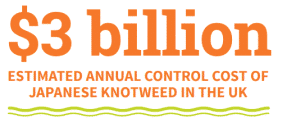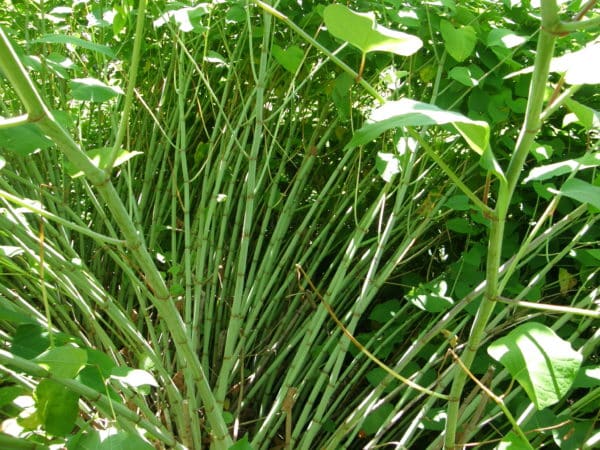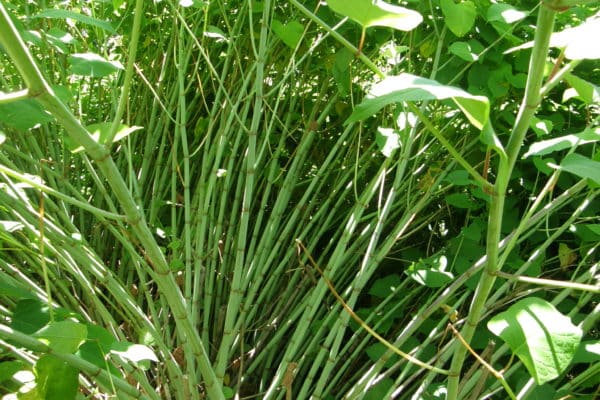Bohemian knotweed
Warning
All knotweeds species in BC can grow through concrete and asphalt, damaging infrastructure. This can result in significant control, management, and repair costs.
About This Species
Bohemian knotweed is a hybrid between Japanese (Reynoutria japonica) and Giant knotweed (Reynoutria sachalinensis) and resembles both species. Knotweeds were introduced to British Columbia for use in gardens and landscaping due to their rapid growth and attractive appearance. There are now four species established in BC: Bohemian (Reynoutria x bohemica), Giant (Reynoutria sachalinensis), Himalayan (Persicaria wallichii), and Japanese knotweed (Reynoutria japonica).
Knotweeds grow aggressively and are very hard to kill. They are widespread throughout the province, and are often found in riparian areas, derelict land, road and railway right of ways and gardens. They thrive in moist soil and full or partial sun. Knotweeds can spread by seed, root fragments, and stem fragments, making them very difficult to control. Knotweeds are designated as Provincial Noxious Weeds by the BC Weed Control Act and Regional Containment/Control by the BC Provincial Priority Invasive Species List.

Knotweeds are one of the 100 worst invasive species as identified by the International Union for Conservation of Nature (IUCN) and a top-ten invasive species for control in BC. Its ability to tolerate a range of soil types and climates means that it has the potential to spread much further than it has to date.
How to Identify
Knotweed species can resemble bamboo canes, growing tall, straight and densely (at a rapid pace). They are generally 1-5 m in height and may persist through the winter as bare grey- or straw-coloured hollow stalks. Stems are green, sometimes with red speckles, and hollow.
In spring, knotweed has plumes of small white to green flowers growing in plume-like clusters from the stem.
Bohemian knotweed leaves are a blend of both parents- they are slightly longer than wide (about mid-way between parents for size) and are typically slightly heart-shaped at the base.

Take Action
Prevention is the best approach.
- Knotweeds Factsheet PDF
-
If you need advice about invasive species on your property or you are concerned about reported invasives in your local area, contact your local government or regional invasive species organization.

PlayCleanGo
Learn about best practices

Plantwise
Learn about best practices
A few non-invasive alternatives to plant instead of Bohemian knotweed include:
- Black elderberry (Sambucus racemosa var. melanocarpa)
- False solomon’s seal (Maianthemum racemosum subsp. amplexicaule)
- Goat’s beard (Aruncus dioicus)
- Red-osier dogwood (Cornus stolonifera)
- Saskatoon berry (Amelanchier alnifolia)
REPORT TO PROTECT BC’S BIODIVERSITY

Use the app
Observe and report to protect BC’s biodiversity

Report through this website
Use our form to tell us what you’re seeing and where.




